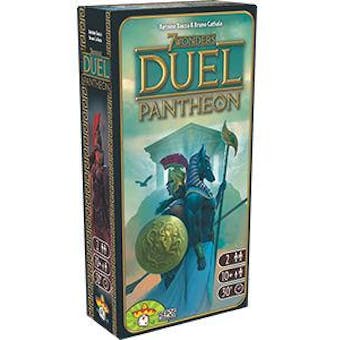
Dave & Adam's Premier Rewards Program
Level Up and Unlock automatic rewards with every dollar you spend
7 Wonders Duel: Pantheon (Asmodee)
Sorry, this item isn't available
We don't have this item available for sale at the moment. Please enter your information to be notified of updates about this product.
-
7 Wonders Duel: Pantheon (Asmodee)
Add a divine element to your games of 7 Wonders Duel with the Pantheon expansion! Pantheon enables you to recruit deities from five different ancient Mediterranean cultures to become patrons of your developing city. Each god or goddess offers a powerful blessing such as fabulous wealth, military fortitude, or the means to thwart your opponent's plans. Grand Temple cards make the game's final Age intensely competitive by offering unprecedented points to you if you devote your city to divine concerns, and two new Wonders offer pathways towards victory by courting the favor of the gods.
Contents:
- One Pantheon board
- Fifteen Divinity cards, five grand temple cards, and one Gate card
- Two Wonder cards
- Seventeen tokens
- One Minerva pawn
- One Score notepad
- One Rulebook
- One Game Aid
In the award-winning card game 7 Wonders Duel, you compete against another player to build the greatest city of the ancient Mediterranean world by constructing a variety of temples, taverns, workshops, schools, and stables. These great citites are also are home to incredible Wonders: the Mausoleum of Halicarnassus, the Great Pyramid of Giza, the Colossus at Rhodes, and more. Any city you build combines the best of Greece, Egypt, Phoenicia, Rome, and Persia, all built out of stone, wood, glass, and papyrus. People pack your city's streets, houses, and theatres, but the divine element that was so pervasive in those civilizations has been missing from the game. Until now.7 Wonders Duel: Pantheon brings the gods of the ancient world into 7 Wonders Duel. You can now seek the favor of deities from five different ancient cultures and bring them together to watch over your city. You might even build your patron gods and goddesses lavish temples to dwell in, or dedicate to them one of the expansion's two new Wonders.
Divine Natures
Ancient Greeks and Romans believed that in order to receive a divine blessing, you had to give the god something in return, some sort of offering or vow. So it goes with the Pantheon expansion: if you want a god's favor, you have to make an offering. During Age I, you collect Mythology tokens, which allow you to choose which deities have a place in the Pantheon, and Offering tokens, which help you court those deities' attention. Then, in Ages II and III, you can activate a god or goddess in the Pantheon instead of taking a card from the structure. To do so, you pay whatever that god or goddess demands from you in offerings and place him or her next to your city.
With Isis on your side, you can use a card from the discard pile to construct one of your Wonders for free. Zeus, whose nod determines what happens and what does not, enables you to discard any single card from the structure that you want, as well as any Mythology or Offering tokens on it. The Phoenician goddess Tanit, whose people were renowned for trade, fills your coffers with twelve pieces of gold. Enki, the Sumerian god of crafts, technology, and creation, lets you choose one of two progress tokens. Minerva's ability to keep the conflict pawn from entering your territory may not instantly bring you victory, but it can save you from military defeat.
Ritual Spaces
Age III introduces another aspect of ancient religion: the ritual space. When playing with Pantheon, instead of incorporating three Guilds into the card structure, you add in three Grand Temples. Each Grand Temple belongs to a different Mediterranean culture. If you have the favor of a god or goddess from that culture, you can build the temple for free. For example, having Isis by your side enables you to build the Egyptian temple; with Enki, you can build the Mesopotamian one.
A single Grand Temple is worth five victory points, but two together are worth twelve, and if you can manage to build three in your city, you'll earn twenty-one victory points for them. This echoes the polytheism common across the ancient Mediterranean, where many cultures borrowed deities from each other. Isis became popular in Imperial Rome, Aphrodite is very similar to Ishtar and Astarte, Minerva is in many ways a Roman version of the Greek Athena. Moreover, focusing too much on one god and neglecting the others was thought to lead to trouble. In Pantheon, therefore, activating multiple gods and creating a city full of Grand Temples to them is among the best ways to achieve victory.
Create Your Pantheon
From the time it was founded in the third century BCE, Alexandria's people worshipped Egyptian, Roman, and Greek gods. A native of that legendary city might even visit a Greek temple one day, then an Egyptian shrine the next. Roman soldiers in Greece and the Near East worshipped the native gods of the area they occupied alongside their own gods. As you choose and activate gods in Pantheon, you'll be emulating these syncretic religious traditions and echoing the history of the ancient Mediterranean, where numerous cultures came together and combined to form something truly great.
Foundations
As in the multiplayer game 7 Wonders, each Age is characterized by its own deck of cards. In 7 Wonders: Duel, the cards for each Age are carefully arranged in a pattern on the playing space with some faceup and others facedown. Cards are inaccessible if other cards rest on top of them, and accessible faceup cards must be taken before facedown ones can be revealed.
As you take turns choosing cards, you'll have to decide how to spend your coins, which resources to acquire, what you might want to discard, and what to build. Even though you want a Clay Pool or Press, you may only be able to build a Theater, Glassworks, or Garrison. The card you take may open up or reveal a card you need, but that your opponent takes first. You are always aware of what your opponent takes and builds, so use that knowledge to your advantage.
In 7 Wonders: Duel, military strength is marked by the Conflict pawn, which travels back and forth along the game board between your capital and your opponent's. Every military Building you construct bears a number of shields, and with each shield, you push the pawn closer to your opponent's capital and away from your own. If it reaches your foe's capital, you've won the game through military victory. Simply keeping it in your opponent's territory, though, will cost them money, earn you victory points, and force them to focus on military spending rather than other pursuits.
The March of Progress
Among the Buildings you may construct in the first Age are a Workshop, Apothecary, Pharmacy, and Scriptorium. On their own, they seem to contribute little to your civilization, no more than a single victory point. A Scriptorium combined with a Library, however, can advance your civilization far beyond its rival. A Workshop combined with a Laboratory could enable you to make remarkable scientific discoveries, and further humanity's overall progress. If you can construct two Buildings with the same scientific symbols, you can take a progress token of your choice. You might acquire Strategy (an extra shield on all your future military Buildings), Agriculture (six coins and four victory points), Philosophy (seven victory points), or another advancement. Yet there is a different route to scientific greatness. A set of Buildings bearing six different scientific symbols grants you an instant victory.
In the second Age you'll begin to see whether a scientific victory is achievable or whether your efforts are best placed in military defense (and offense), public edifices, economic development, or in Wonders. As you begin to focus your civilization, you must nevertheless be careful which cards you draft, and which cards you open up-you don't want to accidentally give a lucrative Building or important scientific advancement to your opponent. And, since resources are no longer available in the third Age, you will want to acquire them whenever you can before that Age dawns.
The third Age is a race for excellence using the most challenging card drafting array yet. Only in the third Age can scientific supremacy be achieved. Only in the third Age can you acquire guild cards, which offer victory points for the number of cards you have in a certain color. And as this Age unfolds, you will at last be able to see how strong your civilization truly is in the areas you've emphasized.
Seven Wonders
No ancient Mediterranean civilization would be complete without its Wonders, whether massive, gold-adorned statues, enticing and exotic gardens, or an expansive circus in which tens of thousands can watch chariot races. 7 Wonders: Duel offers you the chance to build four of the ancient world's seven great wonders. At the beginning of the game, you and your opponent select the wonders that you hope to build. Each wonder demands a unique set of resources and provides a unique set of benefits upon completion. The Statue of Zeus, for example, offers one shield, three victory points, and a chance to discard one of your opponent's brown cards. The Hanging Gardens offer six coins, three victory points, and an immediate second turn-which you might use to build a second wonder.
You can build your wonders as soon as you have the requisite resources. If you're ambitious, you might even construct one during the first Age. Yet because only seven wonders were listed by Philo of Byzantium in his legendary catalog, only seven can be built in 7 Wonders: Duel, rather than the eight that lay before you. Whichever civilization builds four wonders first therefore has a fantastic advantage over its rival. Remember, however, that completing your wonders doesn't guarantee you victory. The wonders are simply another means of making your civilization great.
Triumph
When Roman armies conquered other lands, they would stage immense processions into the city, passing by the Circus Maximus, through the Forum, and up to the temple of Jupiter on the Capitoline. The procession would include wagons full of spoils from other lands: gold, animals, captives, even Egyptian obelisks. Such triumphal celebrations could last several days, and gave all of Rome, from the wealthiest patricians to the poorest plebians, a chance to revel in their civilization's greatness.
7 Wonders: Duel offers you the chance to lead one ancient civilization and conquer another. Will you find yourself defeated, or will you retrace the steps of legendary leaders in triumph?
-
- Manufacturer: Asmodee
- Product: 7 Wonders
- Series:
- UPC/Barcode: 5425016921005
- Release Date: November 7th, 2016
 1-888-440-9787
1-888-440-9787
 FREE Shipping on orders $199+
FREE Shipping on orders $199+
 FREE Gifts with orders $100+
FREE Gifts with orders $100+





